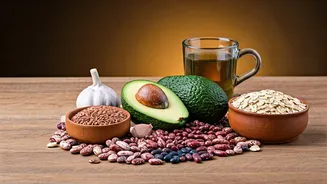Beans and Lentils
Beans and lentils, though often overlooked, are true nutritional powerhouses. They are packed with soluble fiber, a key player in lowering cholesterol.
This fiber binds with cholesterol in the digestive system, preventing its absorption into the bloodstream. Furthermore, beans and lentils are low in saturated fat, making them a heart-healthy choice. They are versatile, and can be incorporated in soups, stews, salads, and curries. Regular consumption can significantly contribute to better cholesterol management. Besides, they provide a good source of protein, helping you feel full and satisfied, thereby preventing overeating. Embrace these humble yet mighty foods for a healthier heart and a balanced diet.
Garlic: The Heart's Friend
Garlic has long been celebrated for its medicinal properties, including its ability to support heart health. Compounds in garlic, such as allicin, have been shown to lower cholesterol levels. Garlic also helps to prevent blood clots and has anti-inflammatory properties, making it a well-rounded ally for your cardiovascular system. To benefit from garlic’s effects, you don’t need to consume massive amounts; just a clove or two daily can make a difference. Incorporate garlic into your cooking by adding it to vegetables, meats, or even making garlic-infused oil. It is a flavorful and effective way to promote heart health. Remember to crush or mince garlic before consumption to release its beneficial compounds.
Green Tea’s Benefits
Green tea is more than just a refreshing beverage; it's a potent antioxidant with heart-healthy advantages. The antioxidants in green tea, particularly catechins, help lower LDL (bad) cholesterol levels while potentially increasing HDL (good) cholesterol. Regularly drinking green tea can also reduce the risk of heart disease. Brewing a cup of green tea is simple. For optimal benefits, choose high-quality green tea and steep it for a few minutes. You can drink it plain or add a touch of honey or lemon for flavour. Make green tea a regular part of your routine to boost your heart health and enjoy its numerous health benefits. Consider it a simple yet powerful addition to your health-conscious diet.
Avocado: The Creamy Hero
Avocado, often enjoyed for its rich texture, is a heart-healthy food that deserves a place in your diet. It is packed with monounsaturated fats, which are beneficial for lowering LDL cholesterol and raising HDL cholesterol levels. These healthy fats are essential for overall cardiovascular health. Furthermore, avocados are a good source of fiber, contributing to healthy digestion and cholesterol management. Incorporating avocado into your diet is easy; add it to salads, sandwiches, or smoothies. You can also enjoy it as a dip with whole-wheat crackers or use it as a substitute for butter or mayonnaise. The creamy hero is a delicious and effective choice to support your heart health.
Flaxseeds for Heart Health
Flaxseeds, though tiny, pack a powerful punch when it comes to heart health. They are abundant in soluble fiber, which binds with cholesterol in the digestive tract. Moreover, flaxseeds contain omega-3 fatty acids, crucial for reducing inflammation and lowering the risk of heart disease. Grinding flaxseeds before consumption enhances nutrient absorption. You can add ground flaxseeds to your morning cereal, yogurt, or smoothies. They can also be mixed into baked goods or used as a binder in place of eggs. Flaxseeds are easy to incorporate into your diet, offering a simple yet effective way to support your heart health and boost your overall well-being. Embrace the tiny seeds and experience their benefits.
Oats: Your Morning Armour
Oats, a staple breakfast in many households, are a fantastic choice for supporting heart health. They are rich in soluble fiber, specifically beta-glucan, which has been shown to lower cholesterol levels significantly. Oats are also low in saturated fat and a good source of other essential nutrients. Start your day with a bowl of oatmeal. You can prepare it with water or milk and customize it with fruits, nuts, and seeds. Oats are incredibly versatile; they can also be used in baking and as an ingredient in other breakfast dishes. Make oats a consistent part of your daily routine and enjoy their numerous health advantages. This simple addition to your diet can make a substantial difference in managing cholesterol levels and promoting heart health.
Integrating into Daily Life
Implementing these dietary changes doesn't have to be challenging. Start by gradually introducing the foods mentioned above into your daily meals. For instance, substitute unhealthy snacks with a handful of nuts or flaxseeds. Add beans or lentils to your favorite soups and stews, or experiment with incorporating garlic into different dishes. Make a habit of drinking green tea regularly. Use avocado as a topping in salads or add it to sandwiches. Also, be mindful of portion sizes and overall dietary balance. Remember that these foods work best when combined with other healthy lifestyle choices, such as regular exercise and avoiding processed foods. With consistency and a little creativity, you can enjoy these heart-healthy foods and improve your cholesterol levels naturally.




















